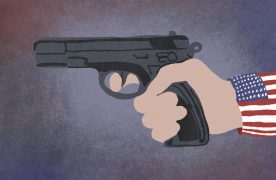Box cutters, switchblades and handguns have all been placed on the no-fly list, but travelers boarding their next flight may have to add another check to their index — toys.
Passengers who carry remote control toys onboard an airplane will be subjected to extra scrutiny at airport checkpoints, according to an advisory released by the Transport Security Administration earlier this week.
The additional screening will include physical inspection of bags, a light patting down and the use of a metal-detector wand on the passenger, TSA spokeswoman Anna Davis said.
TSA announced the plan a few days after two University of South Florida students were arrested on terrorism-related charges for making a video with instructions on how to detonate a bomb in a remote-controlled vehicle.
Davis said the video did not directly influence the policy change, however, adding the National Intelligence Estimate on Homeland Security suggested terrorists in Sri Lanka and India may have previously used remote-control toys as weapons.
“TSA works very closely with intelligent agencies,” Davis said. “We have word from our partners that terrorists may possibly be interested in using remote-controlled toys to pose a security risk.”
Chris Ott, a spokesman for the American Civil Liberties Union, said it is unlikely the additional security measures will infringe on people’s rights unless officials target specific races.
“Safety for everybody is important,” Ott said. “What we don’t want to see is racial profiling at airports.”
Boston University College of Engineering associate professor Hua Wang said it is easy for terrorists to use a remote-control mechanism to set off bombs, just as cellphones have been used to set off roadside bombs in Iraq.
Because of their intricate inner workings, many everyday electronic devices pose a potential bomb threat, Wang said.
“The toy itself does not pose a danger,” Wang said. “It’s the components in these devices — the transmitter, receiver, batteries — that provide materials and a designated process for a terrorist to set off a bomb.”
After the Sept. 11, 2001 terrorist attacks, the TSA heightened security measures by banning box-cutter knives and large containers of liquids, while stepping up screening measures at airport checkpoints.
Wang said the TSA advisory is a reasonable precaution until the administration has specific knowledge about the potential dangers remote-control toys pose.
“When TSA decided to ban liquids, passengers were not allowed to carry any liquids onboard at all,” he said. “After more scientific studies, they adjusted their policy to let passengers carry small amounts of liquids onboard.”
A spokesperson for Logan International Airport declined to comment on the airport’s security policies.
Some Boston University students were critical of the new screening measures. School of Management junior Jacqueline Kwok said the TSA’s prudence is excessive and fosters a stressful environment.
“This creates unnecessary anxiety for travelers,” Kwok said. “Parents trying to travel with kids and the kids’ toys will now find their personal freedom infringed upon at checkpoints.”
This is an account occasionally used by the Daily Free Press editors to post archived posts from previous iterations of the site or otherwise for special circumstance publications. See authorship info on the byline at the top of the page.












